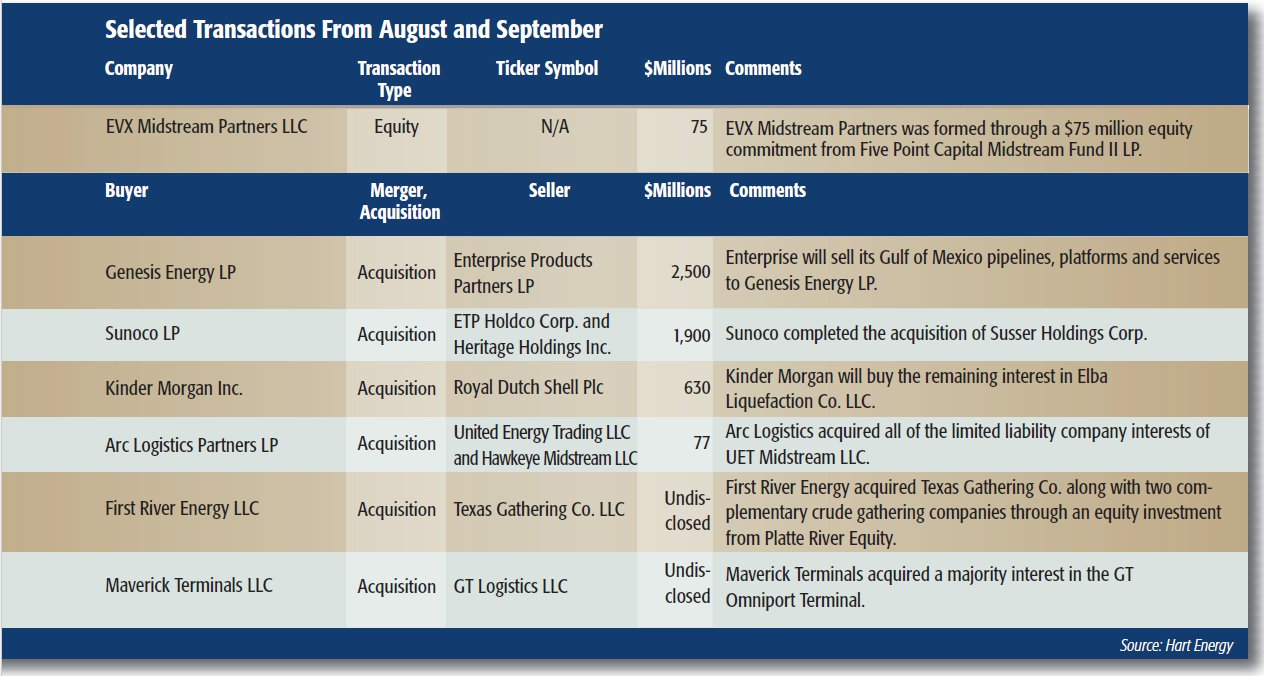Buying companies may actually be cheaper than buying assets,” Peter Botten, managing director of Papua New Guinea-based Oil Search Ltd., mused to Bloomberg recently about the prospect of deals with struggling E&Ps.
Case in point: From August 2014 to August 2015, Magnum Hunter Resources Corp.’s unit price shed 87.4% of its value, a grim data point reflecting the travails suffered by our upstream kin in the downcycle.
In stepped Energy Transfer Equity LP (ETE). The midstream major offered a reported $600 million for Magnum Hunter’s 45.53% ownership in the Eureka Hunter Pipeline in the Marcellus. That’s a $600 million bid for a minority stake in an asset owned by a company with a market capitalization of less than $200 million.
Is this a great industry or what?
Energy Transfer hasn’t surrendered in the bidding war for The Williams Cos. Inc., either. Its $48 billion pitch is still out there and, despite Spectra Energy Corp.’s offer and interest from Kinder Morgan Inc., remains the one to beat.
“We continue to see an ETE acquisition as the most likely outcome,” J.P. Morgan said in a recent research note.
What’s happening is a prelude to a fourth-quarter frenzy of M&A activity that will have the faces of lawyers and investment bankers who specialize in such things glued to their cell phones for months.
“This is one sector where you certainly will likely see an acceleration of M&A activity as companies realize that the organic projects that they felt were going to underpin their growth and underpin their growth in cash flow distributions might not be there,” Christopher Click, KPMG LLP Dallas-based principal, told a gaggle of energy journalists at a recent briefing in Houston. “M&A might be the only means by which to meet this 20%, 25%distribution target that you’ve set for yourself out in the market.”
Energy Transfer has emerged as a sniper on the M&A battlefield, choosing targets carefully and disdaining reckless acquisitions in spite of the availability of cheap capital. “We appreciate ETE’s discipline,” J.P. Morgan said. “Pulling the trigger when the deal economics made sense and passing when warranted.”
It's the fourth quarter. Recharge that phone.
Recommended Reading
New BOEM Regulations Raise Industry Decommissioning Obligations by $6.9B
2024-04-15 - Under new regulations, the Bureau of Ocean Energy Management estimates the oil and gas industry will be required to provide an additional $6.9 billion in new financial assurances to cover industry decommissioning costs.
BWX Technologies Awarded $45B Contract to Manage Radioactive Cleanup
2024-03-05 - The U.S. Department of Energy’s Office of Environmental Management awarded nuclear technologies company BWX Technologies Inc. a contract worth up to $45 billion for environmental management at the Hanford Site.
Laredo Oil Settles Lawsuit with A&S Minerals, Erehwon
2024-03-12 - Laredo Oil said a confidential settlement agreement resolves a title dispute with Erehwon Oil & Gas LLC and A&S Minerals Development Co. LLC regarding mineral rights in Valley County, Montana.
DOE Considers Technip, LanzaTech For $200MM ‘Breakthrough’ Technology Award
2024-03-25 - The U.S. Department of Energy funding will be used to develop technology that turns CO2 into sustainable ethylene.
US Decision on Venezuelan License to Dictate Production Flow
2024-04-05 - The outlook for Venezuela’s oil industry appears uncertain, Rystad Energy said April 4 in a research report, as a license issued by the U.S. Office of Assets Control (OFAC) is set to expire on April 18.





